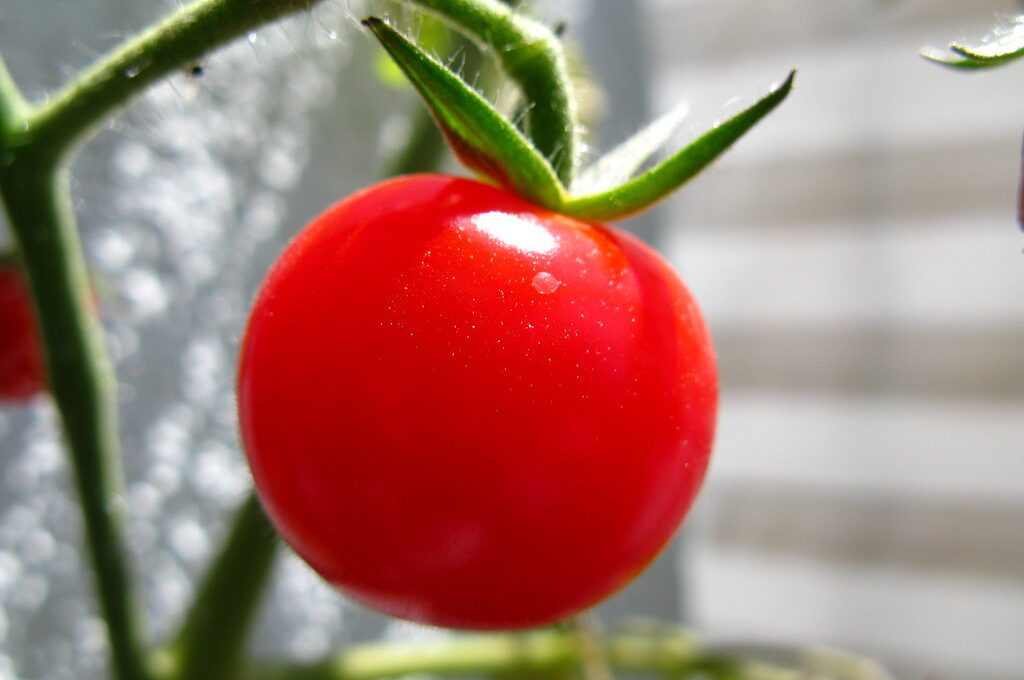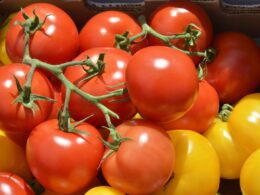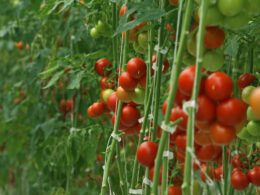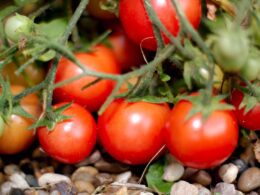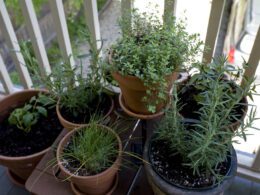You might have heard about using baking soda for various household purposes, but have you ever considered it as a fertilizer for your tomato plants? You want the best for your garden, and fertilizing is an important factor in ensuring the health and productivity of your plants. So, is baking soda a good option?
Let’s dive into the science behind this common household item and its potential effects on tomato growth. Before you grab that box of baking soda and start sprinkling it around your tomatoes, it’s crucial to understand how it might impact their growth. Will it provide necessary nutrients or harm them in some way?
In this article, we’ll explore the potential benefits and drawbacks of using baking soda as a fertilizer for tomatoes. Plus, we’ll offer some tried-and-true alternatives for nourishing those plump red fruits safely and effectively.
So let’s get started on our quest to grow healthy tomato plants with confidence!
Understanding the Science Behind Baking Soda
Now, let’s delve into the science behind using this common household ingredient on your tomato plants. Baking soda, also known as sodium bicarbonate, is a chemical compound that can serve various purposes in gardening. Its alkaline nature helps neutralize acidic soil and can even be used as a natural fungicide to ward off diseases like powdery mildew.
But does it work as a fertilizer for tomatoes? The answer lies in understanding how baking soda interacts with the soil and plants. You see, tomatoes thrive in slightly acidic soil with a pH level between 6.0 and 6.8. Applying baking soda to your garden could raise the pH level outside of this optimal range, making it harder for your tomato plants to absorb essential nutrients like nitrogen, phosphorus, and potassium. These nutrients are crucial for plant growth and fruit production; without them, your tomatoes might not grow or taste their best.
While adding baking soda to your tomato garden may not be the most effective way to fertilize these delicious fruits, there are other ways you can use it safely around your plants. For instance, try using a diluted solution of water and baking soda as a spray to help prevent fungal diseases on leaves or create an organic pesticide by combining it with dish soap and vegetable oil. Just remember that moderation is key – always test any homemade solutions on a small portion of your plant first before applying it all over!
Baking Soda’s Potential Effects on Tomato Plants
Imagine sprinkling a pinch of white powder on your tomato plants, potentially boosting their growth and warding off diseases – that’s the idea behind using baking soda as a fertilizer for tomatoes. Baking soda, or sodium bicarbonate, has been touted as an all-natural solution to numerous gardening problems, from fungal infections to adjusting soil pH levels. But before you start dusting your plants with this common household item, it’s essential to understand its potential effects on tomato plants.
-
Altering soil pH: Baking soda is alkaline, which means that it can raise the pH level of your soil when applied in large amounts. Tomatoes prefer slightly acidic soil with a pH between 6.0 and 6.8; thus, applying too much baking soda may harm your plants rather than help them.
-
Fighting fungal infections: Some gardeners claim that baking soda can help prevent and treat fungal diseases like powdery mildew and blight by creating an inhospitable environment for fungi due to its alkalinity. However, scientific evidence supporting this claim is limited.
-
Enhancing fruit flavor: It’s believed that using baking soda might improve the taste of tomatoes by reducing acidity in the fruits themselves – but again, there isn’t enough research available to back up this assertion.
Though some anecdotal success stories involve using baking soda on tomato plants, it may not be the best option for every gardener or situation. If you’re considering trying this method out yourself, proceed with caution: start by testing a small area or individual plant first and closely monitor any changes before applying more broadly across your garden. Remember that moderation is key – too much baking soda can do more harm than good!
Ultimately, when it comes to gardening, safety and effectiveness matter most, so always seek reliable information about fertilizers or pesticides from reputable sources before applying them onto your precious plants.
Potential Drawbacks of Using Baking Soda as Fertilizer
While it’s tempting to utilize sodium bicarbonate for its potential benefits, one must also consider the possible drawbacks when using it as a fertilizer.
Baking soda can raise the pH level of your soil, making it more alkaline. Since tomatoes prefer slightly acidic soil with a pH between 6.0 and 6.8, an increase in alkalinity may hinder their growth and overall health. Additionally, baking soda has no nutritional value for plants; it doesn’t provide essential nutrients like nitrogen, phosphorus, or potassium that traditional fertilizers offer.
Another issue you may encounter is that excessive use of baking soda could harm beneficial soil organisms like earthworms and mycorrhizal fungi. These creatures play crucial roles in breaking down organic matter and improving nutrient uptake by plant roots – which ultimately results in healthier tomato plants.
By disrupting the balance of these organisms in your garden bed or potting mix, you might unintentionally cause damage to your plants’ natural support system.
So before you reach for that box of baking soda as a quick fix for your tomato woes, take the time to research alternative methods to enhance their growth and health without risking detrimental side effects.
There are many organic fertilizers available on the market specifically designed for tomatoes that contain all necessary nutrients while maintaining ideal pH levels for optimal growth.
Remember: keeping your plants healthy goes beyond just finding an easy solution; it requires understanding what they truly need and providing them with proper care accordingly.
Can Baking Soda Be Used as a Substitute for Miracle Gro for Tomatoes?
Can baking soda be used as a substitute for Miracle Gro for tomatoes? While baking soda is commonly used for various gardening purposes, it does not offer the same miracle gro benefits for tomatoes. Miracle Gro is specifically formulated to provide the essential nutrients and minerals that tomatoes need for optimal growth and development. Baking soda lacks these specific components necessary for healthy tomato plants.
Alternative, Proven Fertilizers for Tomatoes
It’s time to explore some tried-and-true fertilizers that’ll make your tomato plants flourish like never before, without any risky side effects.
When it comes to growing delicious, healthy tomatoes, you can’t go wrong with organic compost or well-aged manure. Both of these natural options provide essential nutrients for your plants and improve soil structure. Plus, they’re eco-friendly and safe for both you and the environment.
Another fantastic option is using a balanced granular fertilizer specifically designed for tomatoes. Look for one with an N-P-K ratio (nitrogen-phosphorus-potassium) of 5-10-10 or 8-16-16, which will give your plants just the right mix of nutrients they need to thrive.
It’s also important to apply this type of fertilizer at the right times – once when transplanting seedlings into the garden and again when fruits begin to form on the vines.
Of course, don’t forget about liquid seaweed or fish emulsion as a foliar spray that can be directly applied onto leaves for quick absorption. This method provides an extra boost of nutrients throughout the growing season without overloading your plants’ roots with too much nitrogen all at once.
By using these proven fertilizers in combination with proper watering techniques and consistent monitoring, you’ll be well on your way to enjoying tasty homegrown tomatoes while keeping both yourself and Mother Nature happy!
Tips for Growing Healthy Tomato Plants
Ensuring the health and vitality of your tomato plants is crucial for a bountiful harvest, so let’s delve into some expert tips that’ll lead you to gardening success.
First and foremost, start with healthy seedlings or young plants from a reputable source. This’ll ensure that you’re not introducing any diseases or pests into your garden right off the bat.
Once you’ve got your seedlings, find a sunny spot for them – tomatoes need at least six hours of sunlight daily to thrive.
To keep your tomato plants strong and safe from harm, regular watering is essential. However, it’s important to avoid getting the leaves wet when watering, as this can encourage disease development. Instead, water at the base of the plant or use drip irrigation.
Consistent moisture levels are key – try not to let the soil dry out completely between waterings but be careful not to overwater either. Mulching around your tomato plants will help retain moisture in the soil and also prevent weeds from competing for nutrients.
Another vital aspect of growing healthy tomato plants is proper fertilization. Start by testing your soil to determine its nutrient content before adding any amendments – this’ll give you an accurate idea of what’s needed for optimal growth.
Organic fertilizers like composted manure or fish emulsion are excellent choices for providing necessary nutrients while also improving overall soil health. Don’t forget about pruning – removing suckers (the small shoots that grow between the main stem and branches) promotes better air circulation and allows more energy to be directed towards fruit production rather than leafy growth.
By following these simple steps, you’ll be well on your way to growing robust, productive tomato plants that yield delicious fruits all season long!
Conclusion
So, is baking soda a good fertilizer for tomatoes? The answer isn’t quite clear-cut. While it does have some potential benefits, there are also drawbacks to consider.
In the end, it’s best to stick with proven fertilizers and follow proper tomato-growing practices. This way, you’ll be sure to have a bountiful harvest of healthy, delicious tomatoes.





